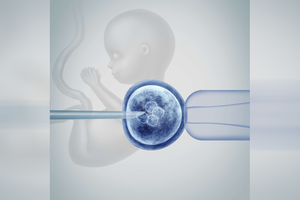Causes and risk factors for male infertility

The problems linked to male infertility include low sperm count, low sperm motility, low testosterone and abnormal sperm.
What you need to know:
- Reduced fertility in men may be due to low sperm count, blockage of sperm flow, or abnormal sperm function.
Dear doctor,
My wife and I have been trying to get a baby for the past three years unsuccessfully. She has six-year-old child from a previous relationship, so I know she is able to get children. The problem must be with me. What can I do about this? Dan
Dear Dan,
About one in seven couples have challenges with achieving a pregnancy after trying for at least one year. While not commonly discussed, the male partner has health challenges that contribute to sub-fertility about half of the time when an underlying issue is identified.
Reduced fertility in men may be due to low sperm count, blockage of sperm flow, or abnormal sperm function. The most severe form is lack of sperm production, called azoospermia. Possible causes of reduced fertility include problems with functioning of the testicles, undescended testicles, blockage of the testicular ducts, ejaculatory dysfunction, hormone problems and genetic disorders. Rarely, the sperm count may be low due to an immune system disorder, where there is production of anti-sperm antibodies that attack the sperms. Factors that can contribute to male infertility include injury, testicular infections or tumours, obesity, alcoholism, smoking or chronic illnesses like diabetes, liver disease, among others. Previous testicular surgery and major abdominal/pelvic surgery are also a risk factor. Exposure to some medications like steroids, chemotherapy and other medications, radiotherapy and environmental toxins can also contribute. Exposing the testicles to too much heat is also a risk factor.
It is advisable for you to be reviewed by a urologist for examination and relevant tests. The tests may include semen analysis, scrotal ultrasound and other tests as need be such as prostrate examination, checking hormone levels, urine tests and testicular biopsy. The treatment will be tailored according to the underlying cause. It is also advisable for your wife to be evaluated in case a problem has developed since she last delivered. In the event that conception cannot be achieved normally, there is assisted reproduction available.
Doc,
Could there be an anti-alcohol drug anywhere in Kenya? I hope it is there, I really need it.
ZM
Dear ZM,
When you are concerned about your alcohol consumption, or if you have tried to cut down the drinking without success, or if you feel guilty about drinking or you continue drinking despite experiencing negative effects of whatever form, then it is likely you have an alcohol use disorder. This is usually due to regularly taking large amounts of alcohol.
In addition, you may have alcohol dependency (addiction) if you cannot function without taking alcohol, or if you have to take more to achieve the same effects, or if you get withdrawal symptoms when you don’t take alcohol, or if you spend a lot of time thinking about or indulging in alcohol and use a lot of resources to get the alcohol.
Treatment of alcohol use disorder and dependency starts with acknowledging there is a problem and being willing to change. The recovery is usually a process and may take a long time. Managing alcohol use disorder usually depends on how much alcohol you usually take and the goal, whether it is to stop completely, or to reduce alcohol consumption to a manageable level. If the alcohol intake is mild, you can stop just by choosing to abstain. For moderate use, you can manage yourself from home with regular check up by a medical professional. For alcohol dependency, it is advisable for you to be managed as an inpatient. The medications used may be for:
Managing withdrawal side effects
Reducing cravings
Preventing relapse
Reducing amount of alcohol taken
Generating negative side effects in case you take alcohol
The most important part of the treatment is psychotherapy, which includes individual, group and family therapy. Initially, the therapy may be in an institution or from an outpatient set up. It’s also important to have someone to walk with you through the journey of recovery.
Dear doctor,
What could be causing muscle cramps in the legs?
Dear reader,
A muscle cramp refers to the sudden unintentional contraction/tightening of a muscle, and sometimes it can be painful. In most cases, muscle cramps last for a short time though sometimes they may last for long, such as muscle cramps in the lower back leading to abnormal positioning of the spine. A muscle cramp may develop following over-exercise or overuse of a certain muscle group, or due to lack of stretching before exercising, or due to muscle injury. Cramps may also develop because of uncomfortable positioning of the legs for a long time. Underlying conditions that may trigger muscle cramps include dehydration, mineral deficiencies, nerve problems, poor blood flow, some chronic illnesses (such as diabetes, thyroid disease, liver or kidney disease) and use of certain medications. Sometimes there is no underlying cause identified.
When you experience a muscle cramp, you can relieve it by: Stretching. Massage Gentle exercise such as walking. Warm or cold compresses. Muscle-relaxing medication
If the muscle cramps are recurrent or if they are severe, it is advisable to be reviewed by a health professional for thorough evaluation. Any underlying issues should be treated such as taking mineral supplements to address deficiencies. Muscle cramps can be prevented or reduced by taking a healthy and well balanced diet, adequate water intake, maintaining proper posture, regular exercise and stretching before and after exercising.



